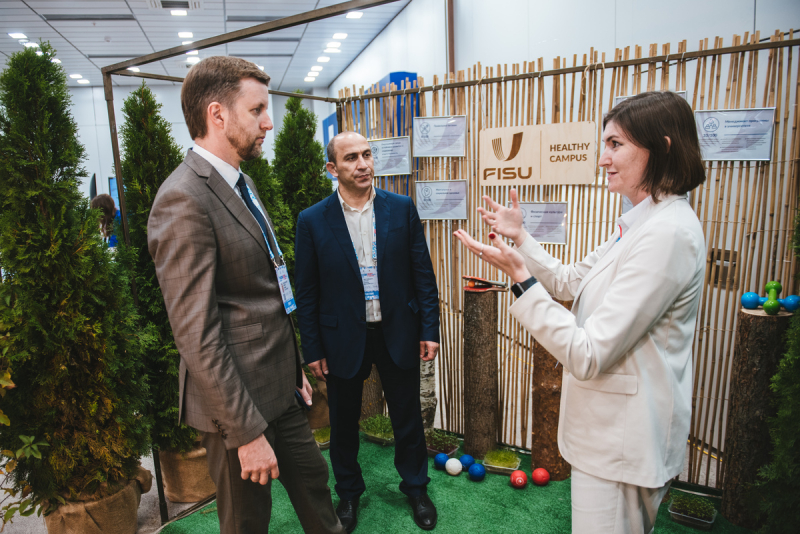About FISU Healthy Campus
The International University Sports Federation (FISU) brings together more than 170 national and 5 continental sports federations in universities across the globe. In 2020, the organization launched the FISU Healthy Campus project with the aim of improving student health, well-being, and ecology on campuses. Over 80 universities in Europe, America, Asia, and Africa currently participate in the program, including 13 Russian universities. In 2022, ITMO University made it to the top-8 universities in Russia that received certified labels at the end of their first year in the program.
According to the project’s rules, participants are required to undertake an internal compliance audit to ascertain their adherence to the program’s 100 requirements within their first year and undergo an external evaluation within their second year. The criteria are divided into the following categories: Physical Activity and Sport, Nutrition, Disease Prevention, Mental Health, and Environment and Sustainability Responsibility.
Sports, ecology, and well-being
As noted by Natalia Shchedrina, a manager of ITMO’s Well-Being strategic project, the university’s goals conform in most respects to the initiative’s requirements and such key fields as sports, healthy eating, ecology, and mental well-being, which are promoted by the program, have been actively pursued by the university’s teams in recent years.

Natalia Shchedrina. Photo courtesy of the subject
“These criteria are meant to help universities see their strengths and weaknesses and thus figure out what they need to work on. ITMO University has already taken steps in this direction. We have working groups and teams developing ways to improve physical activity, healthy eating, and sustainable development on campus. Although it’s highly gratifying to be recognized internationally, we also see this as an opportunity to coordinate our actions, check if we’re on the right track, and see if the name of our project truly reflects what we’re about to achieve. Here, I should also highlight networking that allows us to not only enrich the existing practices, including by learning from our international colleagues, but also look at our initiatives from various points of view,” says Natalia Shchedrina.
With 67 points out of 100, ITMO University received both a compliance certificate and a silver certified label. The program offers four labels: bronze, silver, gold, and platinum. The last two can only be awarded to participants if they have successfully completed the program and passed the evaluation by the initiative’s representatives.
The FISU committee commended the university’s achievements in student sports (ITMO’s KronBars club) and ecology, as well as noted its recently launched Well-Being strategic project. All these initiatives will be included in the program’s collection and be available to other universities across the world.

Albina Rakhmatullina (right). Photo courtesy of the subject
“I first visited ITMO during the National Student Sports Forum, which took place at the university in December 2011, and I was impressed by what I saw here. So, when checking ITMO’s application on our online platform, I already knew how the university held PE classes and sports activities and that students can themselves choose what sports classes and sections they’d like to join and get credits for. I can’t but admire the university’s sports club KronBars, their website, development plan and marketing strategies, as well as how passionate students are at the university. I also enjoyed the projects held by ITMO.GREEN and the university’s GREEN ZOOM standards. In fact, I was highly impressed by the quality of sustainable development initiatives, working areas, coworking spaces, and student-staff interaction. I’ve been to numerous universities worldwide (the US, the UK, Singapore, Switzerland, Italy, France, Canada, and Austria) and what I saw at ITMO placed it alongside the world’s top universities,” notes Albina Rakhmatullina, the FISU Healthy Campus program auditor.





